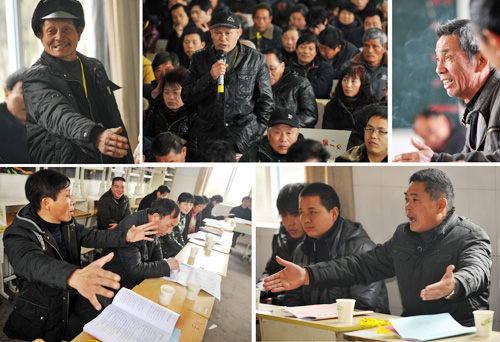|
 |
|
FREE EXPRESSION: Villagers' representatives in Zeguo Town in Wenling, east China's Zhejiang Province, engage in a heated discussion over the town's budget plan on January 24, 2011 (WANG DINGCHANG) |
Renowned for its millennial celebrations in 2000, Wenling in Zhejiang Province is where the sun first meets China's eastern coastline. The city is a bastion for private enterprises, which contribute to 90 percent of local economic growth.
What makes Wenling more famous than many other places in China with flourishing private economies is democratic consultation, a governance reform initiated in the late 1990s. Township authorities in Wenling have since organized dialogues with villagers' representatives to discuss public policies.
Through democratic consultation, the administration is more transparent, and there are fewer misunderstandings or complaints in implementing policies, according to a China Central Television (CCTV) report last December.
"This is a way to encourage ordinary people to be involved in public policymaking. It conforms to the country's efforts to improve its democracy," Chen Yimin, Director of the Deliberative Democracy Office of the Wenling Committee of the Communist Party of China (CPC), told CCTV.
In his report to the 18th CPC National Congress last November, Hu Jintao, General Secretary of the 17th CPC Central Committee, said that socialist consultative democracy is an important form of people's democracy in China.
"Extensive consultations should be carried out on major issues relating to economic and social development as well as specific problems involving the people's immediate interests through organs of state power, committees of the Chinese People's Political Consultative Conference, political parties, people's organizations and other channels to solicit a wide range of opinions, pool wisdom of the people, increase consensus, and build up synergy," Hu said.
Bright spots
In 1999, Zhu Congcai, then Secretary of the CPC Committee of Songmen Town in Wenling, was assigned to deliver a lecture on agricultural modernization. Considering that many such lectures often bore listeners, Zhu decided to make a change. Instead of preaching dry political theory, he proposed holding a consultation that would allow participating villagers to raise questions to officials.
Five days before the consultation, Zhu circulated a notice inviting villagers. More than twice his original estimate of 100 showed up to ask questions ranging from how the government used the previous year's tax revenues to how the following year's road construction was planned.
The consultation's success exceeded expectations. "People were very active and brought up some very constructive suggestions as well," Chen recalled.
Since then, Songmen has used democratic consultation in deciding on multiple public affairs. The Zhejiang Provincial Government sang high praises for the practice, and many neighboring towns later followed suit.
In April 2000, Muyu, another town in Wenling, held its first democratic consultation to discuss the construction of a park in the center of the town as part of a tourism promotion program.
Villagers' suggestions included building more pathways to the entrances and more entertainment facilities in the park. To the great surprise of local officials, some villagers with their late family members buried at the proposed site of the park voluntarily offered consent to have the tombs relocated.
"Without local residents' support, it would have been almost impossible for us to move the tombs away," Jin Xiaoyun, then Secretary of the CPC Muyu Committee, told Xiaoxiang Morning Herald, a newspaper published in Hunan Province.
The topic of Panlang Town's first democratic consultation was to choose a location for constructing residential buildings. The original plan was rejected as it was too close to a factory and there are some differing ideas concerning architectural design.
| 